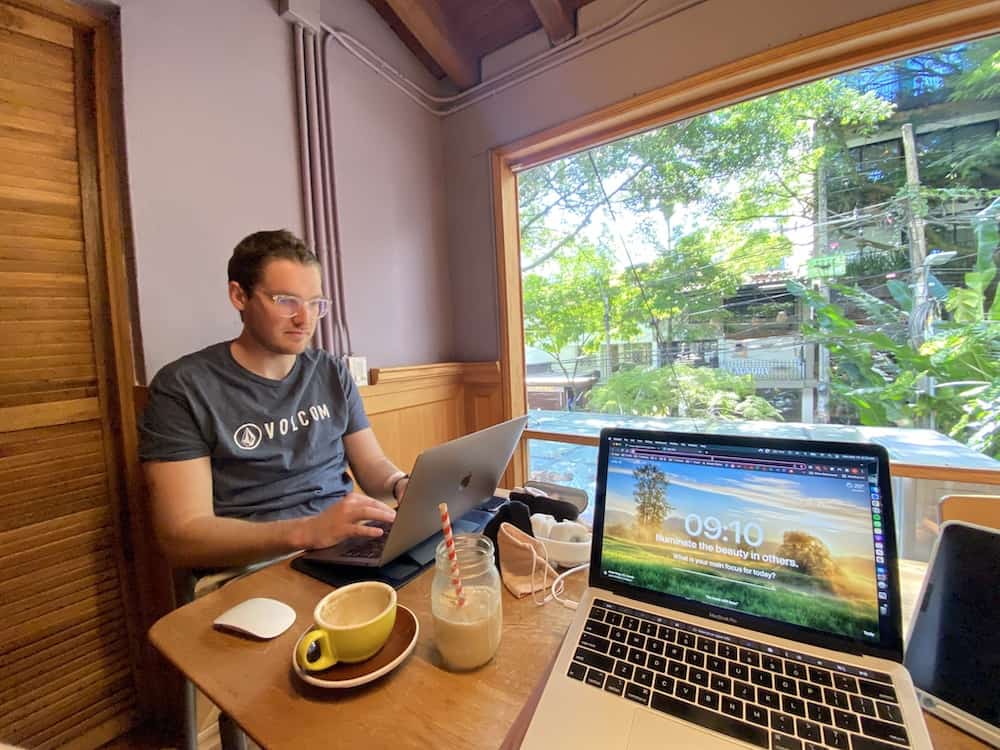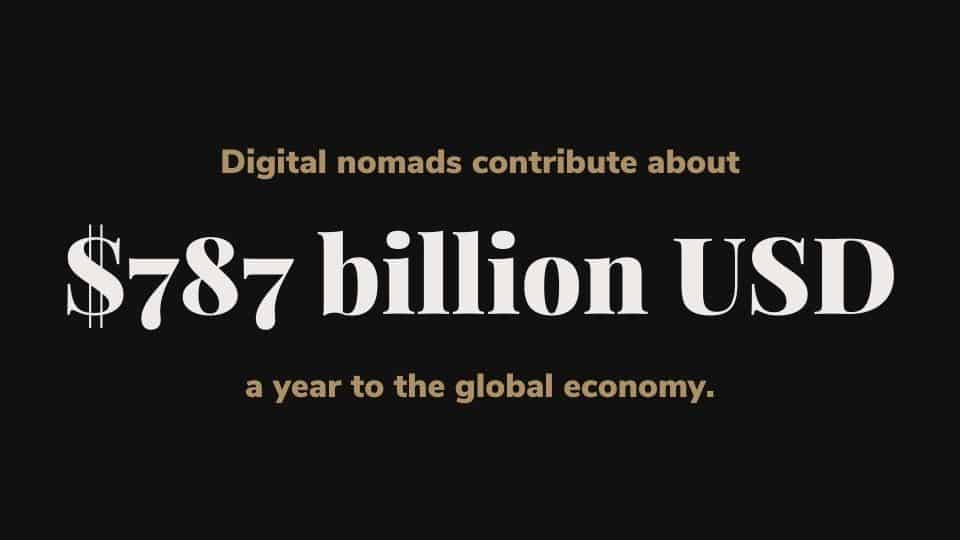
There’s a new buzzword in town and it’s the “digital nomad”.
This used to just be a term that we call ourselves to help people understand what we do, how we live and how we work. But now, countries are making specific visas just for digital nomads.
But what is a digital nomad visa, exactly?
In this article, we’re going to share what a digital nomad visa is, who should apply for it, the eligibility criteria, the countries currently offering them and pros vs cons list of digital nomad visas.
QUICK ANSWER: What Is A Digital Nomad Visa?
Summary: A digital nomad visa is a program created by the government of select countries that allows you to travel and work for a longer period of time. Most digital nomad visas are valid for 1-5 years at a time depending on the country.
The requirements can vary and it’s an extensive application process compared to tourist visas. The digital nomad visa is for people who can work remotely (freelancers, remote workers with a 9-5, digital nomads and entrepreneurs) earning a wage from a country abroad.
Is The Digital Nomad Visa What You’ve Been Looking For?
Want to make the leap and move somewhere you’ve always been dreaming about?
Matthew and I have always wanted to see if we’d like living in Athens or other parts of Greece. Ever since our honeymoon, we have been obsessed with this beautiful country and its culture, food and scenery. But it’s hard to tell if you actually like a place without living like a local for a couple of months, right? With rose-colored glasses, we saw Greece as this dream place but could we actually live there?! We wouldn’t know…
…With a digital nomad visa, you can test the waters and see if you can actually settle in a country well. More than that, you can also just use this visa to live (and work online) in a dream country for longer than 90 days!
A digital nomad visa allows you to temporarily test a location out and see if you actually love the lifestyle in that country. I say temporarily because these digital nomads visas usually only last for a year, after that, it expires – some countries offer longer (2+ years) but it varies quite a bit.
Whether you just want to live in a country for longer than 90 days or you want to see if you would actually enjoy living in xyz country – this is a great, new visa option for you.
What Is A Digital Nomad Visa?
This article is mainly to help you quickly understand what is a digital nomad visa. Let’s say you’ve just come across the term and you want to know what it is, who should apply and get a general idea of the requirements and application process.
The digital nomad visa isn’t for everyone and there are quite a few details that need to be worked out before you even apply for one in a certain country.
What Is A Digital Nomad Anyway?
A digital nomad is a person who can work independently of their location and can travel continuously. The easiest way to think of it is this:
- Digital = uses technology to work online in some capacity
- Nomad = no permanent home base, always traveling around
We’ve been living the digital nomad lifestyle since 2018. Since that time, we have worked online and traveled full-time to 15+ countries. Personally, we move every 30-90 days to keep from burning out! Some digital nomads only travel part-time, keeping a home base (house, car + stuff) and others do it full-time selling off everything they own. You also have slow-mads who travel much slower and only visit around 1-2 countries per year.
The words ‘digital nomads’ and ‘remote workers’ can slightly be interchanged but there is a key difference. We think of remote workers as a type of digital nomad because you can be a remote worker and simply work from home in your home country. Digital nomads typically travel around and work from anywhere in the world (usually not their home country). Again it’s pretty similar and that’s why you’ll see both terms in the article.
Why Are Digital Nomad Visas Created?
For those applying for digital nomads visas, they are created to allow foreigners to live in a country for longer than 90 days.
Countries create these digital nomad visas to attract remote workers. Why? According to digital nomad statistics, digital nomads contribute over $700 billion to the global economy each year. With remote workers, they don’t need to work on the local money but still bring their dollars and spend it within the country.
It’s a win-win! If you’re interested, there’s more on how digital nomads can boost local economies in this Harvard Review.
Pros & Cons Of Digital Nomad Visas
The digital nomad visa isn’t for everyone. There are some advantages and disadvantages to applying for a digital nomad visa. Here are some that we can identify for anyone planning to apply:
Pros of Digital Nomad Visas
- Stay Longer Than 90 Days: Want to live somewhere for a longer period but don’t want to commit completely? The digital nomad visa program will be perfect for you, without too much bureaucracy headache!
- Infrastructure In Place To Handle Remote Work: Worried about the wifi not being great from stunning beaches on a Caribbean island? Don’t! These visas were made for remote workers who rely on decent internet speed which means this shouldn’t be a problem wherever the visa is offered.
- Lots Of Countries Creating Digital Nomad Visas: Digital nomads contribute $787 billion USD to the global economy each year, according to the latest digital nomad statistics. This makes it very attractive for countries to bring in digital nomads and that’s why more than 42+ countries now offer digital nomad visas.
Cons of Digital Nomad Visas
- Extensive Paperwork Needed: You’ll need to be able to show some (if not all) of the following – bank statements, no criminal records, minimum income requirement, health insurance, accommodation, plus more.
- Tax Resident: Be careful with reading the fine print on taxes for a digital nomad visa – you don’t know what tax for an individual could be required if you stay longer than 6+ months. You might be required to pay tax (whether income tax, etc) even on a digital nomad visa.
- Visa Fee: You’ll need to pay the standard application costs to apply for the digital nomad visa. Now there are also immigration lawyers and agencies that can take care of it for you (at an extra cost).
- Proof Of Income: Most digital nomad visa programs will require you to have proof of income. Usually, it can be provided in different ways (savings, investments, letters from an employer and bank statements). Some countries will have a monthly income requirement you need to meet to apply.
- Processing Time: Digital nomad visas are quite new and it might take a while for you to get approved. Some countries have worked out how to fast-track the process but it still takes longer than say a visa-on-arrival.
Is The Freelancer Visa Similar To The Digital Nomad Visa?
Yes! There is actually a visa program called the freelancer visa. The digital nomad visa is pretty similar to the freelancer because well… digital nomads can also be freelancers and vice versa!
Who Should Apply For A Digital Nomad Visa?
Are you a…
- remote worker with a 9-5?
- self-employed individual?
- online entrepreneur?
- digital nomad looking for a base?
You could apply for a digital nomad visa! The key with this visa is that you should either:
- work for a foreign company (not the country where you’re applying)
- own your own business (self-employed elsewhere)
- work as a freelancer with clients abroad
This visa program is not necessarily aimed at students or people looking to move abroad permanently. If you can work from anywhere with a decent income, you can easily apply for digital nomad visas in most countries.
From my research, I feel like any person from any foreign country/passport can apply for these digital nomads visas as long as you meet their requirements. In other words – you don’t have to be a US citizen to go for a digital nomad visa!
General Qualifying Factors To Apply For A Digital Nomad Visa
Every country’s requirements are different. But there are some similarities, in terms of the eligibility criteria you need to meet to apply for the digital nomad visa. Here are some of the general eligibility criteria:
- You must be above 18 years old
- You must pay the application fee for the visa
- You must have a specific minimum monthly income (the amount varies depending on the country)
- You must have a job or business you can do from anywhere in the world
- You must not work in the local economy and local workforce
- *some* require proof of health insurance
If you meet all of these, you can apply for most (if not all) digital nomad visas whether in the Caribbean, Europe and beyond. The only thing that varies greatly is the monthly minimum income requirement – obviously, some countries in Europe are going to have higher proof of income eg. Estonia requires a monthly income of at least €3,504.

Make sure to read the fine print on each country’s eligibility requirements because they aren’t all the same. These key eligibility can also help narrow down where you can apply for a digital nomad visa so it’s best to double-check before applying!
Which Countries Offer Digital Nomad Visas?
Currently, 42 countries are offering digital nomad visas. Some are already in place (we have met quite a few that applied and they were already living in Croatia on this visa) and others have just been announced which means it might take some time to get passed as law.
Here’s a small list of countries that offer digital nomad visas and the duration you are allowed to stay in these countries as remote workers.
| Country | Length Of Visa |
| 1. Antigua and Barbuda | 2 years |
| 2. Barbados | 12 months |
| 3. Bermuda | 12 months |
| 4. Cayman Islands | 2 years |
| 5. Costa Rica | 2 years |
| 6. Croatia | 12 months |
| 7. Czech Republic | 12 months |
| 8. UAE (Dubai) | 12 months |
| 9. Estonia | 12 months |
| 10. Georgia | 12 months |
| 11. Germany | 3 years |
| 12. Iceland | 6 months |
| 13. Mauritius | 12 months |
| 14. Mexico | 12 months, renewable to 3 years |
| 15. Norway | 2 years |
| 16. Portugal | 12 months, renewable to 5 years |
| 17. Spain | 12 months, renewable |
| 18. Anguilla | 12 months |
| 19. Argentina | 12 Months |
| 20. Montserrat | 12 months |
| 21. Aruba | 12 Months |
Keep in that most countries don’t call their visa a “digital nomad visa”. But each of the countries above has a visa that would suit digital nomads in some capacity.
I’d say the majority of digital nomad visas are located in Europe. There aren’t too many Asian countries offering this visa. Surprisingly, a lot of Caribbean countries offer digital nomad visas – who wouldn’t want to work remotely from a beautiful island right?
There are a ton of countries you can obtain a digital nomad visa and the list is only going to continue to grow. The digital nomad movement is here to stay and countries are beginning to see that!
Are Digital Nomad Visas Worth It?
It depends!
If you really want to live somewhere for longer than 90 days, it’s going to be the best long-stay visa option for you…if you’re able to work remotely.
If you’re worried about tax residency, you’ll need to check things a little more carefully because some countries will want to tax you after staying more than 6+ months (again, some countries not all).
Double-check the eligibility criteria for each country as the minimum income requirement varies from place to place. Visa holders can enjoy their country of choice for a longer period of time with this long-term visa, making all the paperwork and bureaucracy is going to be worth it in the end!
We hope this answered your question of ‘what is a digital nomad visa’! Is this something you’re looking at applying for? Comment below and let us know your thoughts?








